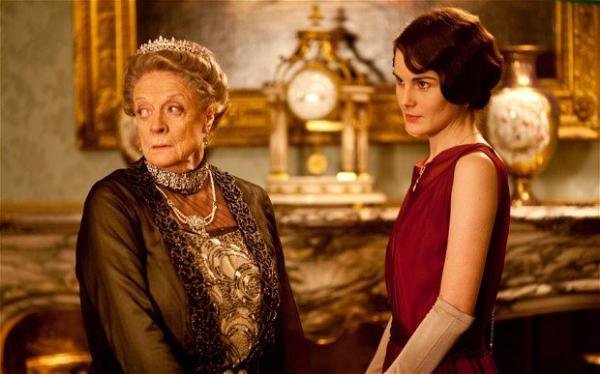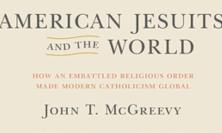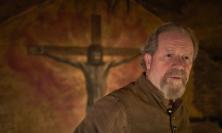Downton Abbey creator, Julian Fellowes has suggested that Season Three of the hit show, now showing in the UK, will contain a storyline about Catholicism – but were there any Catholic themes in the first two seasons? Earlier this year, James Martin SJ and Tim Reidy took ‘A Catholic Look at Downton’ in a podcast for America, and you can read their thoughts on Thinking Faith.
What follows are edited extracts of a podcast published by America on 5 March 2012. You can hear the full podcast here.
NB. For any readers concerned about spoilers, the discussion refers only to Seasons One and Two of Downton Abbey. No details are revealed about Season Three!
TIM REIDY: Perhaps, Fr Jim, you could begin by introducing Julian Fellowes, who is the creator of this show.
JAMES MARTIN SJ: We just read an interesting article in The Tablet, and it turns out that he went to Ampleforth, which is the very prestigious Benedictine school, and credited the Benedictine monks there for encouraging him to take his theatrical interests into a career. So we were thinking about talking about Downton Abbey from a Catholic point of view, and trying to uncover or reveal some of the Catholic themes, or at least Christian themes, that I don’t think a lot of the commentators have really talked about.
TR: There’s nothing obvious on the surface, there are no Catholic characters or at least publicly Catholic characters, but yet there are some themes that we are going to draw out. One is the whole idea of good and evil: from the very first episode you have. on one hand, the saintly valet returning from war in Mr Bates, and then O’Brien on the other side, the mean-spirited lady’s maid who trips him up in order to show him for how weak he is.
JM: I think [O’Brien] really is wicked. But then you also have Thomas, the evil footman, O’Brien’s henchman. But, interestingly, as the series moves on, these characters become a little more complex, even someone like the Dowager Countess, everybody’s favourite character, who at the beginning is just waspish and biting. Towards the end she has that great conversation with Daisy about Daisy’s self-sacrifice in marrying William, the dying former soldier, and she reveals herself to be much more complex. And even O’Brien moves from evil to, I would say, less evil, if not good, after she has a sort of conversion moment when she realises how evil she’s been. There’s that great scene, which I was actually shocked at, I couldn’t believe she did it: the lady of the house, Lady Cora is pregnant; everyone’s so excited because this is possibly the heir to the great house and will save everybody’s fortunes, and O’Brien puts a bar of soap next to the bath so she will slip. Talk about pure evil! But then as the show moves on she feels a certain regret and when Lady Cora is ill she tries to make some sort of confession. So there’s this move from evil to good, or at least a greater complexity. O’Brien is fascinating to me; she seems to be consumed by some kind of resentment, but she is very tearful and very selfless when it comes to taking care of Cora. Whether or not that’s out of guilt or whether there’s a real conversion, I don’t know, it’s difficult.
TR: It’s the Spanish flu, Lady Cora is very sick and [O’Brien] nurses her through the night. Near the end it seems like Lady Cora might actually be near death, she pleads for her and is about to confess that act that you said. So it’s very moving and it shows that for some of these characters who might seem not to care, actually it’s very important that they seek some kind of forgiveness.
JM: And it’s St Ignatius’s dictum that love shows itself in deeds, not in words. She’s really trying to nurse her, to help her. I also think Lady Mary’s character has changed dramatically. Her and the middle sister, Edith, who wrote that terrible letter about Mr Pamuk, were pretty unsavoury in Season One, and Mary’s rejection of Matthew I thought was completely opportunistic: ‘I’m only going to accept you if it turns out you can give me something’. But she also deepens – there’s a sense where she also has to forgive herself, too, before she sees herself as worthy to even be considered by him again. So I think a lot of the characters have to forgive others, have to forgive themselves, and also need to be forgiven – I think that’s a really important theme for the show.
TR: Now you mentioned Matthew and Mary, so we should take up the love story which is at the centre of this, and that is to be expected of a classic, period story as this is. But what’s interesting is the other types of love that Julian Fellowes is interested in showing. And one is during World War I: when Matthew’s injured, Mary tends to him just as devotedly as we were saying O’Brien attended to Lady Cora, with a real sense of love, even in very difficult circumstances when she has to hold his head while he’s getting sick. There’s a very touching scene when Matthew’s mother’s returning, and she’s watching and she says, ‘You’ve become quite the nurse’ to Mary, and Mary says, ‘Well, it’s nothing’ and she says, ‘No, it’s the opposite of nothing’. She doesn’t say it but, ‘You’re showing how much you really love him.’
JM: It’s interesting there are lots of loves. There’s the traditional love between Lord Grantham and Lady Grantham, which at the beginning was a marriage of convenience; there’s Matthew and Lady Mary; there are all sorts of other romantic relationships like that, that you are hoping to end in marriage, like Anna and Bates. But there’s also something like Carson and Lady Mary – there’s a love there – or Carson and Mrs Hughes; there’s a kind of love and a fondness. There’s that beautiful scene where Carson thinks he’s going to work for Lady Mary and Sir Richard – the evil Sir Richard! – and Mrs Hughes says, ‘Well, I will miss you if you go’. So there’s fondness there and there’s fondness below stairs. So I think it’s an interesting point that there are different kinds of loves besides the romantic love that is at the centre of the show between Mary and Matthew.
TR: And different kinds of family, too. You’ve got the classic family, who live in this house, and who is going to be the next to inherit it is of utmost importance. But then you have these families downstairs – people who often don’t have parents or they have long since passed away, and their only family is the Crawleys.
JM: We were saying earlier that we don’t want to elevate it to something that it’s not. There was that great, classic memoir that came out, Below Stairs, that talked about how there really was a divide between, as the woman said, ‘us and them’ (it was written by a woman in service in one of these big manor houses). And sometimes when I’m watching the show I wonder if we’re being fed something that seems good for us but may not be really that accurate. So this idea about there being this great love between the upstairs and the downstairs makes for good drama, but how realistic is it? I wonder if we would feel the same way if it were about slavery in pre-Civil War America, if we would say, ‘Oh isn’t that wonderful, that they’re all getting along so well’! I think of the novel, Brideshead Revisited where one of Evelyn Waugh’s characters, the Oxford aesthete Anthony Blanche, warns the protagonist, Charles Ryder, against ‘that creamy English charm’ that kills everything it touches and somehow blinds our critical faculties. As much as I celebrate these loves and these romances, I have to sometimes check myself and say: is this really plausible? Would Carson really be that open with Lady Mary? Would he be, at the end of season 2, hugging her publicly? Maybe he would, I don’t know much about English country houses! But from what I read about the reality of it, maybe that’s a little farfetched.
TR: Now there are some in Britain who have been very critical of this show, who feel like they glorify this kind of rarefied class system, one of which is Simon Schama, the historian. I’ll read you one quote from him here, it says: ‘It's a servile soap opera that an American public desperate for something, anything, to take its mind off the perplexities of the present seems only too happy to down in great, grateful gulps.’
JM: I wonder what the Dowager Countess would say about that!
TR: So we might be guilty of that but I’m trying to find some redeeming things here about the show. So, some other themes: what about grace, and the workings of grace? Perhaps we can address it in the character of Daisy and her relationship with William.
JM: Well that’s a very interesting relationship, and very complex. Daisy was encouraged by Mrs Patmore, the cook downstairs, to marry William before he goes off to war. It’s a conflict between two goods because Mrs Patmore obviously wants the best for William; she wants to give him a sweetheart to pine for, to give him something to live for. And Daisy feels funny about that because I don’t think she’s completely sold on William, but in the end when he comes back wounded and is about to die, she marries him. Mrs Patmore really is trying to encourage that and most people think [Daisy]’s being very selfless, including William’s father; but [Daisy] doesn’t, she feels pretty conflicted.
TR: Well, it’s interesting: Daisy’s the lowest person on the Downton Abbey chain. She’s not allowed upstairs and she’s at Mrs Patmore’s beck and call but she has a great deal of integrity, so much so that she doesn’t want to – what she feels is – lie. She did not love William enough to marry him, she does not want to go along with this, and is even almost willing to say something to William’s father but I think it almost pushes her to learn something about herself as she starts to say, ‘Well, maybe I did really love him’.
JM: Well there’s that great moment of grace which brings us to what we were talking about just recently with the Dowager Countess, something of a farfetched scene where Daisy is standing upstairs in the drawing room and she is being talked to and given advice by the Dowager Countess who says, ‘You must have loved him if you did something that wonderful for him.’ It was a form of love which allows her in a sense to forgive herself and to move on. And it also shows that the Countess knows a little bit more about life than we would think from her zippy asides. Sometimes I think she’s just like Oscar Wilde in drag! I find her character fascinating. At the beginning [of Downton Abbey]I wrote that the show, as Simon Schama was saying, celebrates income inequalities, celebrates a kind of noblesse oblige: ‘Isn’t it wonderful that Lord Grantham actually went to the pub to talk to Bates as if they were equals?’ And also the Dowager Countess bothered me a little because she was basically mocking people: a lot of the things that were repeated on the web were basically put-downs of other people. But she has revealed herself, or Julian Fellowes has revealed herself to be a lot more complex, which I think also is a tribute to Maggie Smith’s wonderful acting skills.
TR: Yes, when the war comes and the hard decisions have to be made, she’s often on the right side. She’s the one who brings William to the house and said, ‘Let him die here’, even when there’s resistance because, ‘No, no, no, he’s not an officer, he doesn’t deserve to be here’. She says, ‘Enough with that, I’ll call in some chips and get him here’, so when it gets down to it she’s willing to do the right thing.
JM: Suffering might be our next theme. People are often punished very severely for what they do. There’s that scene where Lady Mary and Matthew have a stolen kiss, while his fiancée is dying upstairs, and of course the fiancée comes down, very wan with the shawl around her, and we are given to believe that she has seen the kiss. And of course she dies and Matthew says that she died from a broken heart. But he’s really punished: he’s down in the dumps and it seems like the marriage is off. But with these small peccadilloes – for example, Mr Bates saying, ‘I wish my wife were dead’ lands him almost in the hangman’s noose – there’s a bit of drama in terms of how much people have to suffer for their ills.
TR: You did mention Bates, maybe we should talk about him more as a character: somebody who, as someone on Slate said, wears his topcoat as a crown of thorns because he always is burdened by something.
JM: And he rarely looks happy, even when he’s with Anna. He looks so mopey all the time. But that’s the theme of suffering – he really is the long-suffering person and is trying to do the right thing. So it’s very interesting to see the way different people suffer. I think also the way Mrs Patmore suffered when her nephew was found to be a deserter and shot, was very interesting. And the other part of the suffering I like, in terms of the way it’s presented, is the way people respond. Lord Grantham sending Mrs Patmore to an eye hospital, I thought, was very compassionate. There are these intrusions of compassion and forgiveness and grace in the midst of suffering that cut the divide between upstairs and downstairs which I think is kind of moving.
TR: One other theme that I think is interesting is these people and how they approach work and the dignity they find, especially the people living below stairs, in these jobs that they do, which we may consider kind of unnecessary and superfluous. Even Matthew – Julian Fellowes is smart when he brings him on – says, ‘I don’t need these people to do this work for me, this is just unnecessary’. But by saying that you’d essentially put poor old Molesley out of a job! But that’s an interesting question, especially I think in the character of Carson and the real professionalism he brings to his job. He finds a great deal of satisfaction in it.
JM: He does, and he also I think helps other people see the dignity in their work. I’d love to have someone like Carson working for me! But even someone like Mrs Patmore: she accidentally puts salt into one of her dishes and when it’s returned to her, she is mortified and she cries; she takes such pride in her work. I think even the lady’s maids and the valets take pride in their work. I thought a very telling moment was when Branson, the chauffeur, goes and asks for Sybil’s hand from Lord Grantham; Lord Grantham gets upset and says, ‘You were carrying on behind my back, all the while you were bowing and scraping’. I thought: does he really think that these people are doing work that’s dignified? Or does Lord Grantham really think that this is kind of servile work himself?
TR: Although he’s the one who makes the case to Matthew, when he wants to get rid of Molesley, saying: ‘Where are you going to stop? If you don’t use Molesley, when you take over Downton Abbey, are you also going to get rid of other people you consider unnecessary?’ His approach, this noblesse oblige approach is that these people need work. So he’s playing it both ways a little bit there.
Maybe we can end by talking about the title. You brought up an interesting idea. The name, ‘Abbey’: what are the origins of that?
JM: Well, I think it lies in the mind of Julian Fellowes, I’m sure he’ll probably tell us at some point, but an abbey would have been a monastery at the time. I’m wondering if that house was an abbey, which strains credulity, or more likely that the house was on the grounds of a former abbey. A lot of these great houses – this is the case in Brideshead, too –have these ruins nearby, the ruins of the old abbeys, and they’re very picturesque, and that was a very popular subject for the romantic painters as well, the tumbledown abbeys. But in the time of Henry VIII these places would have been dissolved, and so you and I were talking earlier about the possibility of whether or not this idea of the abbey and the dissolution and the destruction is somehow an image, a metaphor for what is going on at Downton Abbey. Eamon Duffy has written a lot about this, about this period of time and how violent it was. Monks were killed and priests were killed and these abbeys were destroyed, so a word like dissolution is even kind of a sugar coating! But whenever I see Downton Abbey, I wonder how much that image or that Catholic sensibility of that part of history is going to be brought to the fore or whether it will just be a sort of motif, underlying it.
![]() Full podcast available at: http://www.americamagazine.org/content/podcast/podcast-index.cfm?series_id=1325
Full podcast available at: http://www.americamagazine.org/content/podcast/podcast-index.cfm?series_id=1325![]() America
America






